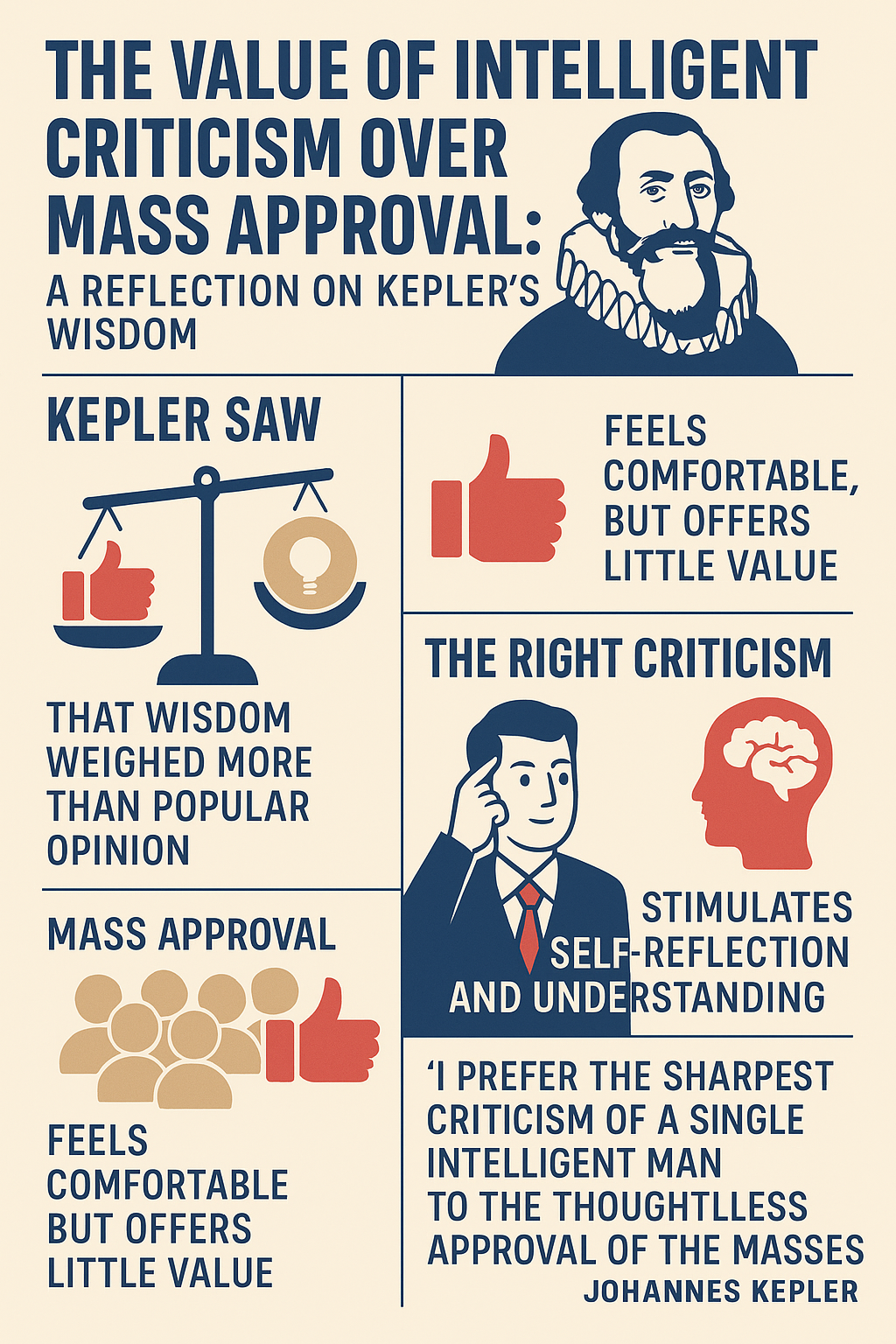“The Value of Intelligent Criticism Over Mass Approval: A Reflection on Kepler’s Wisdom”
Johannes Kepler once said, “I much prefer the sharpest criticism of a single intelligent man to the thoughtless approval of the masses.” At first glance, it’s a bold statement—one that sets truth above popularity, discernment above applause. But in light of history, psychology, and philosophy, it is a profound insight into how individuals and societies either elevate or erode truth and progress.
The Courage to Face Criticism
Kepler, a key figure in the scientific revolution, knew firsthand the cost of challenging accepted dogma. He stood in opposition to both religious and academic elites of his time. His preference for intelligent critique over mass approval wasn’t just about academic honesty—it was about courage. He understood that genuine progress requires people who will think deeply, question boldly, and offer dissenting perspectives, even if those critiques are painful to hear.
This principle extends far beyond science. Throughout history, the prophets, reformers, and revolutionaries—figures like Christ, Paul, Socrates, Thomas Paine, and the Founding Fathers—were often criticized, persecuted, or even executed for daring to question the status quo. They, too, preferred truth to popularity.
Mass Approval as a Tool of Control
Today, the masses are often manipulated by algorithms, corporations, and media conglomerates that reward conformity and punish independent thought. The “thoughtless approval of the masses,” as Kepler warned, is not rooted in understanding but in conditioning. When society elevates the consensus of the crowd over the wisdom of the few, it opens the door for demagoguery, cultural decay, and manipulation by oligarchs.
The global elite understand this well. As we’ve discussed in relation to figures like Covey, Gileadi, and thinkers like Chomsky, the masses can be pacified through consumption, idol worship, political spectacle, and digital distraction. In such an environment, those who think independently—those who criticize, question, and dissent—become not just inconvenient but dangerous.
The Power of Noble Dissent
Bridging this divide between truth and popularity requires reviving the virtue of principled criticism. True growth—intellectually, spiritually, and morally—requires us to welcome the honest feedback of those with integrity, even if it stings. This is why Kepler’s quote resonates so strongly with what classical liberal education and timeless moral wisdom teach: that the goal is not to be liked, but to seek truth and become wise.
This is echoed by Stephen Covey’s idea of “living with the end in mind,” by the Arbinger Institute’s emphasis on “living outside the box,” and by Gileadi’s call to “spiritual integrity” over religious hypocrisy.
Rejecting the Echo Chamber
Modern culture often celebrates affirmation over introspection. Social media thrives on likes, not on thoughtful disagreement. But when everyone agrees mindlessly, error thrives. Jesus Himself was rejected by the religious elite not because He was untruthful, but because He was truthful—and they couldn’t control Him. His most dangerous weapon was not a sword but the spoken word: a word that revealed corruption, pride, and hypocrisy.
Paul’s ministry mirrored this courage. He constantly challenged the prevailing culture, both in Jewish religious structures and Roman imperial ideology. He taught a new way—a culture of inner transformation, humility, and freedom from elite exploitation. And he paid dearly for it.
Choosing Truth Over Comfort
The choice to value the sharpest criticism of a single intelligent man means committing to personal accountability and resisting groupthink. It means building relationships of trust over the approval of the mob. It means seeking teachers, elders, and thinkers who will challenge us, not flatter us.
In the end, Kepler’s insight is not just a preference for critique—it is a call to character. It reminds us that lasting transformation—personal and cultural—comes not through the cheers of the crowd, but through the refining fire of truth spoken by the wise.





